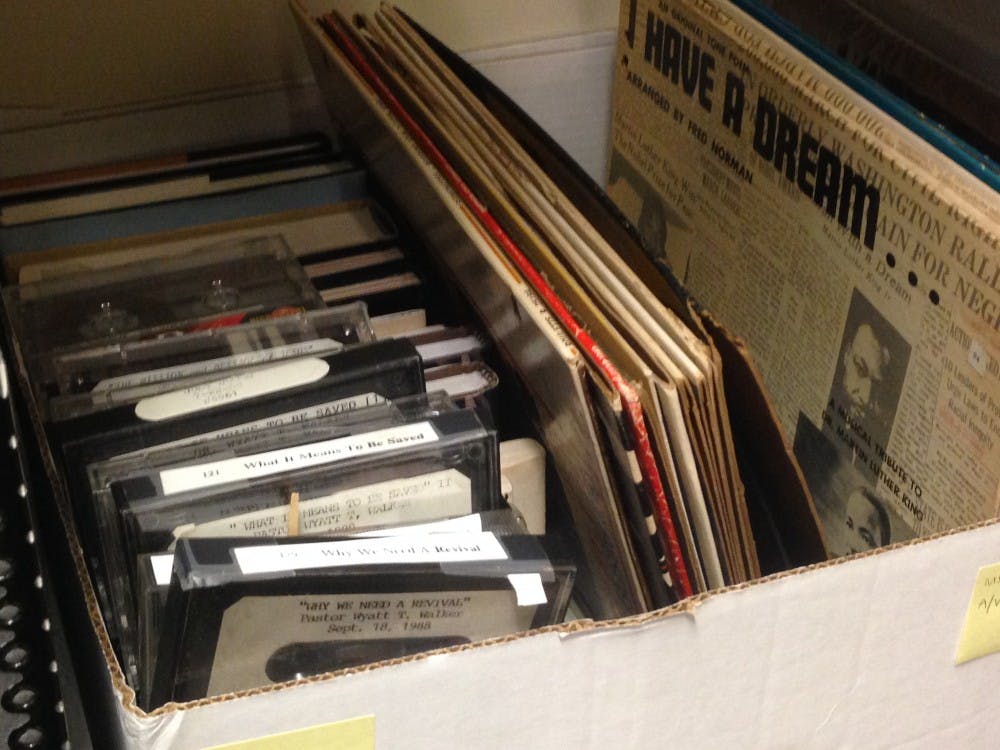Photographs of Martin Luther King Jr. in jail. A telegram from John F. Kennedy. Notes from the Southern Christian Leadership Conference, a significant organization in pushing civil rights. All these materials sit in the basement of Boatwright Library, being organized so one day researchers can learn more about the civil rights era and the donator of the materials — Wyatt Tee Walker.
Walker, an influential civil rights leader who served as King’s chief of staff, donated his collection of saved brochures, photographs and other items related to the Civil Rights Movement to the University of Richmond years ago, but the collection only started being processed about last year.
Walker, along with his wife Theresa Walker, played a key role in the civil rights movement, giving the movement greater media attention and planning out the Birmingham protests. He also played an active role opposing the apartheid regime in South Africa.
The Walkers had first approached the university with their collection through Joseph Evans, dean of the Morehouse School of Religion and friend to the Walkers, Evans said. Evans had been discussing the importance of preserving their canon with the Walkers, he said, and suggested they do so at the University of Richmond, where Evans was taking classes about philanthropy in the School of Professional and Continuing Studies.
Evans suggested Richmond as he said he thought it had evolved beyond its reputation as an upper-middle-class institution resistant to external criticism. Evans spoke with the previous University President, Edward Ayers, about the possibility of getting the collection from the Walkers, Evans said.
When Ayers expressed interest in the collection, Evans realized that the university was open to restitution and reconciliation regarding race, he said, and reassured Ayers that the Walkers could be persuaded.
Interestingly, President Ronald Crutcher also has ties to Walker — he listened to one of Walker’s sermons as a child, Head of Rare Books and Special Collections Lynda Kachurek said.
In any case, the Walkers wanted the collection to stay in Virginia, as Walker was an alumnus of Virginia Union University in Richmond and his first act of protest took place in nearby Petersburg, Kachurek said. The Walkers’ respect for Ayers along with proximity to the university were key factors in their decision.
As of now, only about one fourth or one third of the collection has been organized, said Andrea Kohashi, the archivist dedicated to handling the collection. She hopes to have as much organized as possible by the end of the summer, she said.
“It’ll be one of the most significant and largest collections that we have,” Kohashi said.
The university may start opening the collection in pieces to encourage people to start looking at the work even if the entire collection has not been processed yet, Kachurek said.
The collection, which is the university’s first Civil Rights collection, also complements the collection from Watkins Abbitt, a former member of the House of Representatives who fought against racially integrated schools, she said.
Enjoy what you're reading?
Signup for our newsletter
The collection so far contains many different materials, including notes, brochures, awards, music tapes and telegrams. Some of the collection is currently in storage and comes from the church Walker preached at in Harlem, Kohashi said.

While much of the material is relatively mundane, some items stood out, she said, like a telegram from John F. Kennedy inviting Walker to a meeting discussing Civil Rights and a note from King that said, “Let Wyatt handle this.”
The collection shows a unique economics interpretation of the Civil Rights Movement, as Walker focused his strategies on reparations for slavery and designing campaigns to hurt the pocketbook as a form of protest against racism, Kachurek said.
Evans also conducted an interview with the Walkers over the course of two days on behalf of the university. Because no biography of Walker exists, the oral history of a general overview of his life could help future biographers and researchers, Kachurek said.
Evans had great praise for Walker, saying that Walker was gracious to others while also being an intelligent leader. The discussions he has had with Walker, Evans said, also shed light on how great King was.
Walker still talks about King in the present tense, Evans said, and speaks about him with incredible reverence.
“I don’t know how Dr. Walker’s in awe of anyone except Jesus,” Evans said, laughing.
The collection’s availability is also important in light of police brutality and race relations, particularly under a Donald Trump presidency, Evans said.
One professor, Nicole Maurantonio, brought her "Digital Memory and the Archive" class, which produces content for the Race and Racism at the University of Richmond Project, to preview the collection last fall, Maurantonio wrote in an email.
“As we ask questions regarding the University of Richmond’s failure to desegregate sooner, we can bear witness to the work of leaders such as Dr. Walker, who actively sought to advance the cause of racial justice,” Maurantonio wrote.
Evans also highlighted the importance of Richmond holding the collection.
“For Richmond to house the papers means that Richmond is trying to clear itself of a very, very controversial past,” he said.
Contact news writer Kay Dervishi at kay.dervishi@richmond.edu.
Support independent student media
You can make a tax-deductible donation by clicking the button below, which takes you to our secure PayPal account. The page is set up to receive contributions in whatever amount you designate. We look forward to using the money we raise to further our mission of providing honest and accurate information to students, faculty, staff, alumni and others in the general public.
Donate Now



